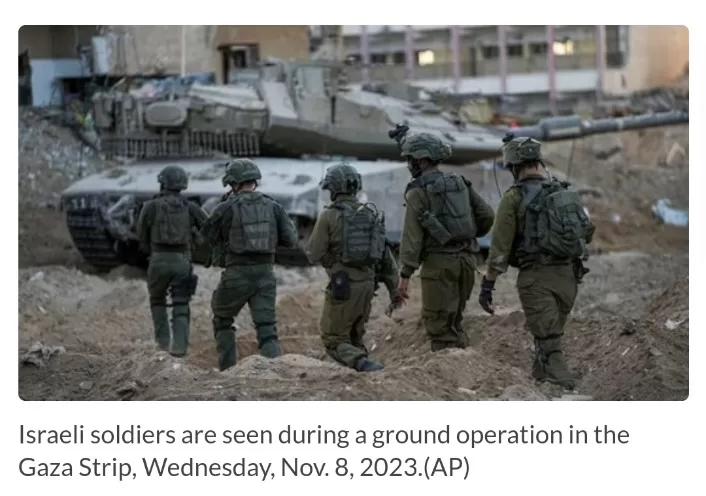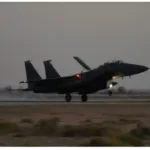The Israel-Hamas conflict has garnered profound international attention in the tumultuous landscape of the Middle East. The United States has persistently cautioned against any potential ‘reoccupation’ of Gaza by Israel.
The devastating aftermath following the unexpected assault launched by Hamas militants on October 7 is perceived by the senior leadership of the Gaza-based Islamic group as a necessary cost for a grand accomplishment. The rationale behind Hamas’ audacious assault on Israel, wherein numerous militants breached southern borders, resulting in the unfortunate demise of nearly 1,400 Israelis and the abduction of around 240 individuals back to Gaza, lies in their aspiration to ‘alter the entire equation’ rather than engaging in a mere skirmish.
Israeli military forces were observed conducting a ground operation in the Gaza Strip, an event that transpired on Wednesday, November 8, 2023.
Khalil al-Hayya, a prominent member of Hamas’ top leadership, expressed, “We have successfully reintroduced the Palestinian issue to the global discourse, and regional tranquility has become an elusive concept.”
Another Hamas representative articulated the hope that “the state of conflict with Israel may become a permanent condition along all our borders,” anticipating support for their cause from Arab nations.
Concurrently, a report in a prominent U.S. daily disclosed that negotiations to secure the release of at least 50 hostages held by Hamas were on the brink of fruition but were ultimately derailed by the Israeli military’s ground offensive in Gaza. This development occurred in the context of Israel consistently rebuffing international appeals for ‘humanitarian pauses’ and ceasefires, as a precondition for releasing hostages.
As per the Gaza-based health ministry administered by Hamas, the retaliatory Israeli military campaign has tragically claimed the lives of over 10,500 individuals, including a significant number of innocent children.
The United States has sternly rebuffed Israeli Prime Minister Benjamin Netanyahu’s proposal to assume security control in Gaza following the eradication of Hamas. Senior U.S. official Anthony Blinken issued a resolute warning against the ‘reoccupation’ of Gaza and advocated for Palestinian governance over the enclave, stating, “No reoccupation of Gaza after the conflict’s conclusion. No attempt to encircle or besiege Gaza. No territorial reduction… It must encompass Palestinian-led administration, unification of Gaza with the West Bank under the Palestinian Authority.”
Clashes unfolded within a one-kilometer radius of the region’s largest hospital, Shifa, which has become a focal point in this conflict. The Israeli military contends that Hamas’ primary command center is situated within and beneath the hospital complex, with senior leaders of the group using the facility as a shield.
Over 70% of Gaza’s 2.3 million inhabitants have already evacuated their residences since the onset of the conflict, with a notable surge in the number of residents fleeing from the north. Crowds of people have thronged Salah al-Din Street, Gaza’s primary southbound artery, surpassing the numbers recorded on the preceding Tuesday, when the United Nations reported that approximately 15,000 individuals migrated southward, a figure triple the previous day’s count.
The escalating turmoil in the Middle East has offered Russia and China an opportunity to intervene in the region and reshape its geopolitical dynamics. Russian President Vladimir Putin embarked on a visit to Kazakhstan on Thursday, while Turkish leader Recep Tayyip Erdogan and his Iranian counterpart Ebrahim Raisi are anticipated to arrive in Uzbekistan, indicating renewed diplomatic interest in the area. Simultaneously, more than 1,000 kilometers to the south, a summit of the Economic Cooperation Organization is scheduled in Uzbekistan’s capital, Tashkent. The event will host the Iranian and Turkish presidents, as well as the Prime Minister of Pakistan, Anwaar-ul-Haq Kakar, alongside Central Asian leaders.
France’s President Emmanuel Macron is set to host a conference on humanitarian aid for Gaza on Thursday, despite Israel’s absence due to its sustained bombardment of the territory since the October 7 Hamas attack. Nevertheless, all governments harbor a vested interest in improving the humanitarian conditions in Gaza, including Israel, as noted by a Macron aide, who spoke on the condition of anonymity prior to the event.







